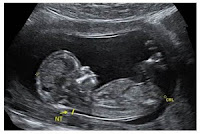Fetal nuchal thickness (NT) refers to the thickness of the
part that appears dark in the back of the baby's neck on ultrasonography. It is
applied to pregnant women between 11 weeks 1 day and 13 weeks 6 days.
There is a relationship between increased fetal nuchal
thickness and some chromosomal anomalies, especially Down syndrome.
A neck thickness of more than 3 millimeters is considered an
increased fetal nape thickness.
Conditions with increased fetal nuchal thickness: Chromosomal
disorders: trisomy 13, trisomy 18, trisomy 21 (down syndrome), Turner syndrome
(45, X0) Fetal nuchal thickness does not increase only in chromosomal
anomalies. Other conditions that increase: Heart anomalies Lung anomalies
(diaphragm hernia) Kidney anomalies Abdominal wall anomalies (omphalocele,
gastroschisis) Some genetic diseases (Arthrogryposis, Noonan syndrome,
Smith-Lemli-Opitz syndrome, Stickler syndrome, Jarcho-Levin syndrome and some
skeletal anomalies Fetal In cases where the nuchal thickness increases, the
risk of heart anomalies is increased, so fetuses with increased nuchal
thickness must be evaluated by echocardiography.
The greater the NT thickness, the greater the risk of an
anomaly in the fetus. Normal values of NT were determined according to each
gestational week. According to these values, the risk is determined according
to the percentage increase. Fetuses with NT thickness between 90-95% percentile
according to gestational week have a chance of being anomaly more than 90%. The
risk of anomaly is very high in cases with NT above 99% percentile. In these
cases, it is possible to evaluate whether there is a chromosomal anomaly in the
fetus with CVS and possible anomalies in the fetus are scanned with detailed
ultrasound examination. It is important to re-evaluate fetuses with increased
NT in this NT between 14-16 weeks. This is a good indicator if the nape edema
decreases and goes down to normal limits during these weeks, indicating that
the risk of an anomaly in the baby is low. If the nuchal thickness does not
decrease in the re-evaluation made between 14-16 weeks, it is likely that there
is a genetic anomaly or infection in this fetus.
- AMNIUM FLUID MEASUREMENT
- AMINOSYNTHESIS
- CORDOCENTESİS
- CHORİONİC VİLLUS SAMPLİNG (CVS)
- NST (NONSTRES TEST)
analysis in pregnancy
fethal nuchal thickness test
fethal test
nuchal thickness
nucheal thickness test in pregnancy
pregnancy
pregnant
















